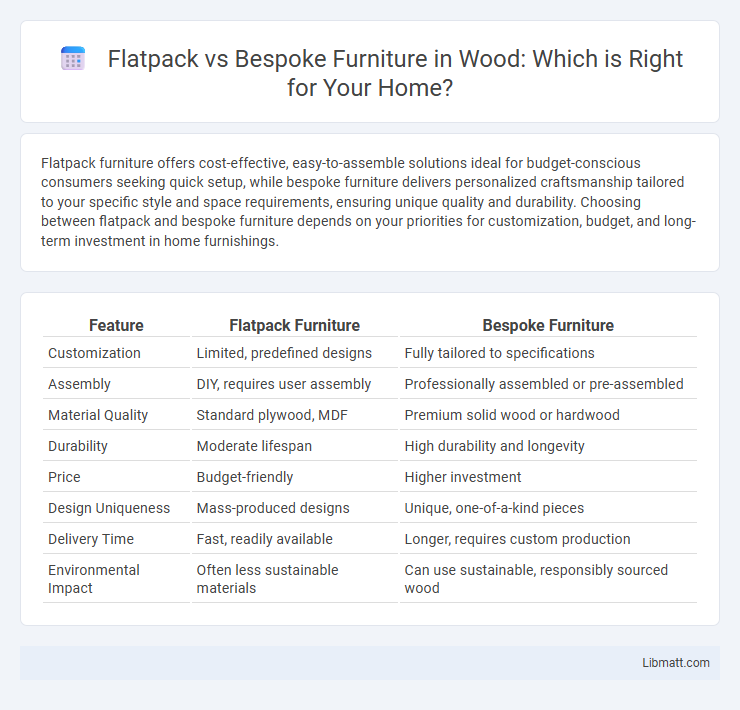Flatpack furniture offers cost-effective, easy-to-assemble solutions ideal for budget-conscious consumers seeking quick setup, while bespoke furniture delivers personalized craftsmanship tailored to your specific style and space requirements, ensuring unique quality and durability. Choosing between flatpack and bespoke furniture depends on your priorities for customization, budget, and long-term investment in home furnishings.
Table of Comparison
| Feature | Flatpack Furniture | Bespoke Furniture |
|---|---|---|
| Customization | Limited, predefined designs | Fully tailored to specifications |
| Assembly | DIY, requires user assembly | Professionally assembled or pre-assembled |
| Material Quality | Standard plywood, MDF | Premium solid wood or hardwood |
| Durability | Moderate lifespan | High durability and longevity |
| Price | Budget-friendly | Higher investment |
| Design Uniqueness | Mass-produced designs | Unique, one-of-a-kind pieces |
| Delivery Time | Fast, readily available | Longer, requires custom production |
| Environmental Impact | Often less sustainable materials | Can use sustainable, responsibly sourced wood |
Introduction to Flatpack and Bespoke Furniture
Flatpack furniture consists of ready-to-assemble pieces designed for easy transportation and affordability, commonly found in large retail stores. Bespoke furniture is custom-made to precise specifications, offering unique designs tailored to individual preferences and spaces. The choice between flatpack and bespoke depends on factors like budget, customization needs, and assembly preferences.
Key Differences Between Flatpack and Bespoke Furniture
Flatpack furniture is mass-produced, designed for easy assembly, and offers cost-effective, standardized options with limited customization. Bespoke furniture is custom-made to specific measurements and design preferences, providing superior quality, unique aesthetics, and tailored functionality. Flatpack emphasizes affordability and convenience, while bespoke prioritizes craftsmanship and personalized detail.
Cost Comparison: Flatpack vs Bespoke
Flatpack furniture typically offers a more budget-friendly option, with prices significantly lower due to mass production and simplified assembly processes. Bespoke furniture involves higher costs because of customized design, premium materials, and skilled craftsmanship tailored to your specific needs. Your investment in bespoke pieces often results in unique, durable furniture, while flatpack prioritizes affordability and convenience.
Design Flexibility and Customization Options
Flatpack furniture typically offers limited design flexibility with pre-set sizes and styles, making customization challenging. Bespoke furniture provides extensive customization options, allowing you to tailor materials, dimensions, and finishes precisely to your preferences and space requirements. Opting for bespoke solutions ensures your furniture fits perfectly and reflects your unique taste.
Material Quality and Durability
Flatpack furniture typically uses engineered wood such as MDF or particleboard, which offer lower durability and are more prone to damage over time compared to bespoke furniture crafted from solid hardwood or high-grade plywood. Bespoke furniture benefits from superior material quality, featuring premium, durable woods and customized finishes that enhance longevity and resistance to wear. As a result, bespoke pieces often withstand daily use better and maintain structural integrity longer than mass-produced flatpack options.
Assembly and Installation: Pros and Cons
Flatpack furniture offers easy DIY assembly with pre-drilled holes and clear instructions, saving You installation costs but may require more time and patience. Bespoke furniture is professionally assembled and installed, ensuring precision and durability, though it often involves higher labor fees and scheduling constraints. Choosing between the two depends on Your preference for convenience versus customization and craftsmanship.
Sustainability and Environmental Impact
Flatpack furniture often has a lower environmental footprint due to efficient packaging that reduces transportation emissions and the use of standardized materials promoting recyclability. Bespoke furniture typically involves higher-quality, durable materials and craftsmanship, contributing to longer lifespan and reduced waste over time. However, bespoke designs can sometimes utilize sustainably sourced wood and eco-friendly finishes that further enhance their environmental benefits compared to mass-produced flatpack options.
Space Optimization and Practicality
Flatpack furniture offers efficient space optimization through modular designs and compact packaging, ideal for small living areas and frequent relocations. Bespoke furniture is tailored to specific room dimensions and user needs, maximizing space utilization with customized storage solutions and unique layouts. Practicality varies as flatpack pieces provide affordability and ease of assembly, whereas bespoke options deliver durability and personalized functionality.
Lifespan and Long-Term Value
Flatpack furniture typically has a shorter lifespan due to its assembly methods and use of lower-cost materials, which can lead to wear and structural weakness over time. Bespoke furniture, crafted with higher-quality materials and customized joinery, offers superior durability and longevity, making it a valuable investment for long-term use. The long-term value of bespoke pieces often surpasses flatpack options by combining aesthetic appeal with resilience, reducing the need for frequent replacement.
Choosing the Right Furniture for Your Needs
Flatpack furniture offers affordability and ease of assembly, making it ideal for budget-conscious individuals or those who move frequently. Bespoke furniture provides customization and superior craftsmanship tailored to your specific style and space requirements. Consider your lifestyle, budget, and long-term needs to make the best choice for your home.
Flatpack vs bespoke furniture Infographic

 libmatt.com
libmatt.com